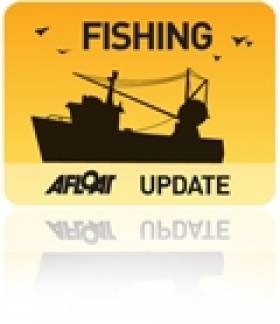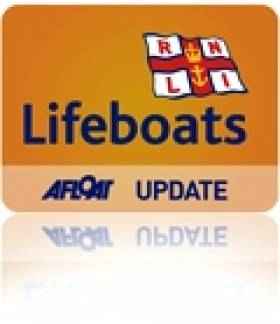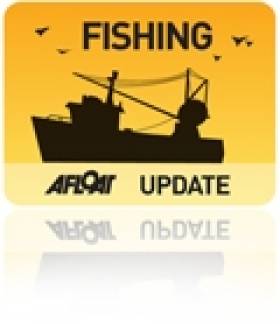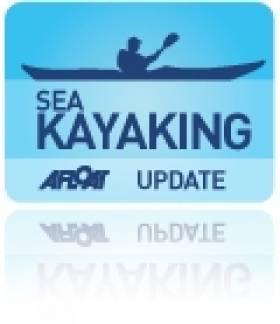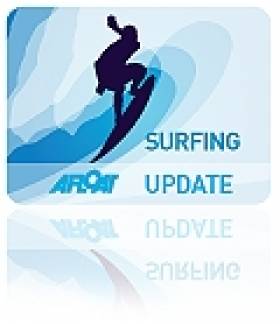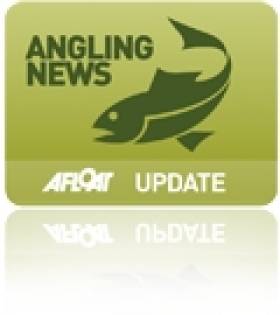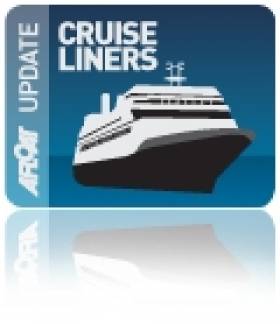Displaying items by tag: Donegal
Man Dies After Lobster Boat Incident Off Donegal
#Overboard - Breaking News reports that a man has died after falling overboard from a fishing vessel off Donegal this afternoon (Tuesday 16 June).
The deceased had been working on a lobster boat with a colleague off Horn Head when the incident occurred.
First on scene in the search and rescue operation was the Mulroy unit of the Irish Coast Guard, who recovered him from the water
He was then transferred to the Rescue 118 helicopter for airlift to Letterkenny General but was pronounced dead after arrival.
Body Of Spanish Fisherman Recovered Off Donegal
#Fishing - The Irish Times reports that a post-mortem will be conducted on the remains of a Spanish fisherman found off the Donegal coast early yesterday (Monday 1 June).
According to The Nationalist, the man was believed to have gone overboard from the Spanish fishing trawler on which he was working on Sunday night.
The body of the 56-year-old was recovered from Killybegs Harbour around lunchtime yesterday after a widespread search by local lifeboats and coastguard, and removed to Letterkenny General Hospital.
#RNLI - Arranmore RNLI saved two fishermen on Wednesday afternoon (8 April) after their 10m boat capsized off the Donegal coast.
A member of the public who was watching the fishing vessel from the shoreline raised the alarm at 2.50pm after he saw the boat capsize two miles south of Arranmore.
Arranmore RNLI’s boarding boat, which was already at sea with coxswain Anton Kavanagh and mechanic Philip McCauley on board, made its way to the scene.
Weather conditions at the time were described as blowing a gentle Force 2 to 3 wind but there was a heavy ground swell of three to four metres.
During their short passage, the volunteer lifeboat crew spotted and followed a track of fuel, and once on scene observed the wreckage of the stricken vessel. They then observed the two fishermen in the water approximately 300 yards from where the boat had capsized.
Both men were very cold when they were pulled from the sea and brought onboard Arranmore RNLI’s boat.
They were brought to Aphort Harbour, where they were made comfortable before being airlifted by the Irish Coast Guard’s Rescue 118 helicopter from Sligo and transferred to Letterkenny General Hospital.
Speaking following the callout, Anton Kavanagh said: "Both men are very lucky to be alive today and full credit must go to the member of the public who saw the boat capsize and raised the alarm, because the fishermen were not due back to shore for a couple of hours.
"We were delighted to be able to help and are glad that both men are safe and well."
Loss Of Late Diver's 'Black Box' Means Full Story Of Donegal Incident Not Fully Explained
#Diving - The loss of a late diver's 'black box' means we will never know exactly what happened in the drowning incident off Donegal in July last year, according to the Belfast Telegraph.
As previously reported on Afloat.ie, hospital chaplain Rev Stewart Jones (56) died after getting into difficulty while diving off St John's Point near Killybegs.
At the inquest into his death at Sligo Court House on Monday 2 March, coroner Eamon MacGowan recorded a verdict of accidental death by drowning.
In a statement read to the court, Rev Jones' diving partner Aaron Buick explained how they had waited out poor conditions before setting out on their dive, but within 15 minutes - having dived to 23 metres - the reverend signalled to return to the surface.
Buick described the "sickening" wave action on the water as he assisted Rev Jones with his back-up air cylinder, and noted his distress when they reached the surface shortly after.
"I had to stop every 15 to 20 seconds as he was spitting out his regulator and swallowing water as the waves broke over us," his statement read.
Diving expert Rory Golden, who was called as an expert witness, said Rev Jones' dive equipment was found to be in good working order, but his dive computer – which records information such as available oxygen and air pressure – was never recovered.
The Belfast Telegraph has more on the story HERE.
Hong Kong Bans Donegal Oysters Over Food Poisoning Scare
#Seafood - Donegal's oyster industry has been hit by an import ban in Hong Kong over an outbreak of food poisoning.
According to The Irish Times, food safety investigators in the Chinese territory were notified by Irish authorities two weeks ago that the presence of norovirus was confirmed at a raw oyster processing plant in the north-eastern county that services the crucial Asian market.
Hong Kong subsequently banned the import of raw oysters from Donegal "for the sake of prudence". More HERE.
'Ireland's Toughest Race' Brings Elite Athletes To Donegal
#Kayaking - It's been two years since David Burns and Maghnus Collins completed their epic 16,000-mile, 292-day Silk Roads to Shanghai adventure by foot, bike, raft and kayak.
They became in the process the first people to navigate Asia's longest river, the Yangtze, from source to sea by kayak.
In the meantime, they've kept their ambitions closer to home, but no less adventurous – starting a gruelling 24-hour challenge in the rugged landscape of Donegal simply called The Race.
As SportsJoe.ie reports, The Race is no ordinary race. Think a triathlon – running, cycling and swimming – but swap out the swimming for kayaking, add on an extra discipline (in thus case climbing) and cap it off with a full marathon run through the night.
All in all, competitors must cover a distance of 250km within 24 hours. And amazingly, there are some who can do that with hours to spare.
Take Canadian athlete Ben Wells, who set the record of 15 hours and 22 minutes in last year's race, and believes that even that time can be beaten in this year's even scheduled for next weekend, 7-8 March.
But for most of those taking part, only 10% "will be aiming to win it," says Burns. "The rest will be testing themselves against the course.
"The camaraderie was massive last year - everybody was willing the next person on, giving encouragement. We're expecting the same this year."
SportsJoe.ie has much more on the story HERE.
Furious Waves Off Inishowen Peninsula As 'Weather Bomb' Hits Ireland
#Weather - Huge waves came crashing over the Inishowen Peninsula yesterday as the Atlantic 'weather bomb' hit the northwest coast.
The video above, care of The Daily Edge, shows the sheer power of the swells that brought waves as high as 62 feet off Irish shores, putting the cream of the world's big wave surfers on high alert.
But as previously reported on Afloat.ie, the best surfing conditions need more than just a big swell - with the forecast wind direction putting paid to any attempts at riding a monster.
Major Angling Development on the River Lackagh, Co Donegal
#angling – Minister of State, Joe McHugh TD, visited the River Lackagh, Co Donegal, on Monday 20th October to view at first hand major angling development works currently underway to enhance this highly scenic salmon and sea trout fishery.
As part of an overall joint management plan for the development of the fishery, the Creeslough Angling Club, in conjunction with Inland Fisheries Ireland (IFI), have completed a major upgrade and expansion of angler access and car parking facilities along the lower reaches of the river near Creeslough village. The majority of the work was carried out by Tús community work placement workers, with materials and additional labour supplied by IFI.
Commenting on the visit, Minister McHugh said: "I had a very positive visit to the River Lackagh where I had an opportunity to see for myself the very encouraging development carried out on the upgrading and expansion of facilities at the fishery and the great work being carried out by all groups, including the Creeslough Angling Club, the IFI and on a broader level, the Donegal Angling Tourism Alliance.
"I would like to thank those present for giving clear and concise briefings on how developments are underway and outlining where they believe the future of angling for the River Lackagh and the surrounding lakes is heading. There are many opportunities here which are being pursued by local and national groups and I commend them on their hard work to date and look forward to working closer and supporting where I can, as Minister and within the Department of Communications, Energy and Natural Resources."
Previous developments on the fishery, funded mainly under the Salmon Conservation Fund administered by IFI, have seen a series of fishery and habitat enhancement measures completed including introduction of spawning gravels, fish passage improvement, selective bank clearance and erection of livestock fencing along key river bank sections. Salmon numbers have improved steadily on the fishery in recent years with the fishery re-opened on a 'catch and release' basis for the past two seasons.
Milton Matthews, Director, Inland Fisheries Ireland, briefed Minister McHugh on progress towards securing a major capital project for the fishery next year which would see a crump weir and fish counter facilities installed on the river. If successful, this proposal would represent the first such counter along the north Donegal coast.
Niall Gallagher, Paddy Boyle, chairman and secretary of the Creeslough AC, and consultant Kevin O'Connor, presented a copy of the 'Future Development plan for angling tourism and conservation of the Creeslough Fisheries to the Minister. The plan details future angling development proposals for the River Lackagh system and surrounding lakes including creation of additional angling spaces on the Owencarrow River, as well as provision of improved access, parking and mooring facilities at Glen Lough, Natooey and Roosky lakes.
The plan represents one of a number of similar projects developed by the Donegal Angling Tourism Alliance (DATA), a group formed in 2012 to promote game and sea angling in Donegal in partnership with Inland Fisheries Ireland.
Dr. Ciarán Byrne, CEO of Inland Fisheries Ireland, expressed his delight with achievements to date in Donegal, highlighting what can be achieved jointly by local angling clubs and interest groups working closely in partnership with IFI to secure development and long term sustainable management of fisheries. He commented: "Inland Fisheries Ireland is delighted to lend its support to the Donegal Angling Holidays initiative for the promotion of game and sea angling in the region."
Seaman Airlifted By Coastguard After 'Assault' On Vessel Off Donegal
#Coastguard - RTÉ News says Gardaí are investigating an alleged assault on a man who was airlifted by the Irish Coast Guard from a vessel off the coast of Donegal this morning (Friday 19 September).
The Irish Independent has more on the airlift, saying the seaman on a Liberian registered merchant ship has sustained chest injuries.
The Irish Mirror is reporting the incident on the Africa Star as a 'stabbing' but no specifics are known at this time.
The Sligo coastguard helicopter Rescue 118 reached the vessel in international waters some 220 miles off Donegal Bay just after 7am this morning to winch the casualty on board and airlift him to the mainland for treatment.
Greencastle Visited by 51,000 tonnes Cruiseship
#CruiseDonegal – Having sailed from Belfast, the 51,000 tonnes Crystal Symphony anchored this morning off Greencastle from where as previously reported, Donegal Co. Council are backing the Loughs Agency to upgrade facilities.
The visit of Crystal Symphony is an impressive sized cruiseship to Lough Foyle. The €170,000 investment in Greencastle is to develop the lucrative cruise trade to the north-west. The aim is to increase cruise-based visitors to tour the Inishowen Peninsula, with Malin Head been the main destination attraction.
Crystal Cruises, operators of the ultra-luxury 900 passenger-plus cruise line won three first-place awards from CruiseLine.com's Bon Voyage magazine. The online publication's panel of experienced cruise editors chose the winners for the first annual Editor's Choice awards, giving Crystal five accolades overall – more than any other luxury line.
Among the categories won was for Best Refurbished Ship in which Crystal Symphony was awarded Silver. The 238m long cruiseship having recently undergone a $15 million redesign.
The redesign for example involved a newly-styled Avenue Saloon, one of the ship's most popular venues. The piano bar retains its 19th-century gentlemen's club feel with rich mahogany woods, buttery leathers, and luxe velvets. So click HERE for a peak and more!




























